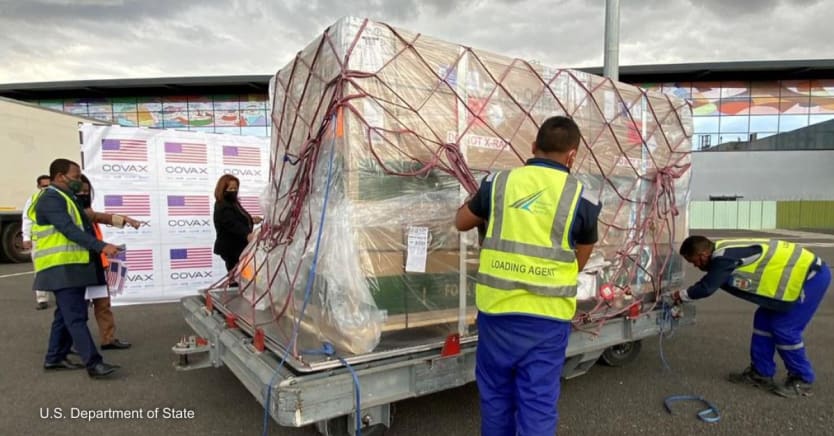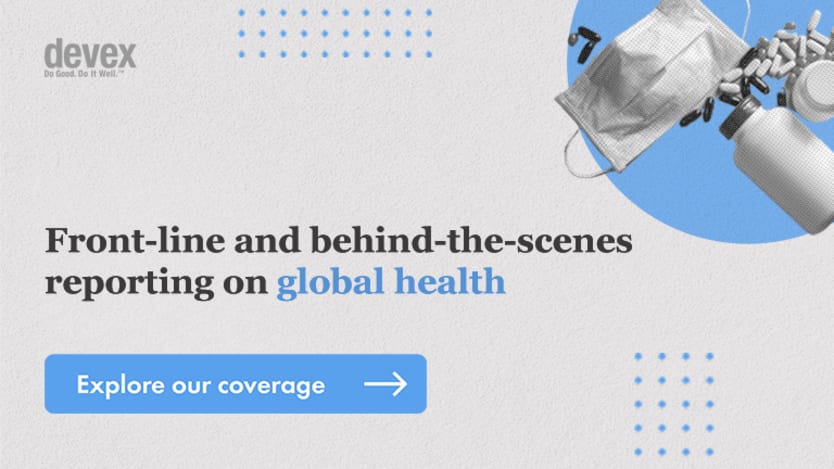US, Netherlands unconvinced on aid eligibility of surplus vax donations

Wealthy countries failed to agree whether to count donations of excess COVID-19 vaccines toward their aid budgets this week, fueling calls by civil society to scrap the move completely.
Sign up for Devex CheckUp
The must-read weekly newsletter for exclusive global health news and insider insights.
NGOs argue that including surplus jabs initially bought for domestic use as foreign aid only rewards high-income countries for hoarding more vaccines than they need, and risks artificially boosting development assistance budgets by billions of dollars.
Some donors feel similarly, with the United States and the Netherlands among those most concerned by the latest proposal in the Working Party on Development Finance Statistics at the Organisation for Economic Co-operation and Development’s Development Assistance Committee.
The text sets a price of $6.72 per dose — a weighted average of the donated doses delivered to low-income countries under Gavi, the Vaccine Alliance’s COVAX AMC — which countries would use when reporting their 2021 official development assistance.
Donated doses must have a minimum shelf-life of 10 weeks upon arrival in a receiving country, unless otherwise agreed with the recipient. And only doses that actually arrive, rather than pledges, are eligible.
Last Friday, the U.S. informed the 29 other DAC members that though Washington opposed the idea that donating excess domestic supplies should count as ODA, it could agree to the proposal — which is supported by most members — provided more conditions were added.
These included that:
• Domestic supply donations be eligible for 2021 only (until donors incorporated vaccine procurement for low-income countries into their regular development planning).
• Excess dose donations be clearly delineated from other funds and announced publicly in DAC’s press release this spring on the preliminary 2021 ODA figures to boost transparency.
• DAC members commit to donate, not sell, COVID-19 vaccines to low-income countries, supporting vaccination as a global public good.
Yet as the Tuesday deadline arose for any objections to the current proposal, no consensus emerged. An OECD spokesperson emailed Devex Tuesday: “No decision has yet been reached on potentially updating procedures for reporting vaccine donations. The DAC will revisit the issue in January.”
A spokesperson from the Dutch Ministry of Foreign Affairs told Devex Thursday that though the Netherlands also has reservations with the text, it would go along with it, “in the spirit of compromise.”
“However, the Netherlands states that this cannot be considered as a precedent for other pandemics, nor for donations of other products/medicines, nor a solution for financing Global Public Goods in general,” the Dutch spokesperson emailed.
The vaccines in question “were bought mainly with the goal to vaccinate our own population and not [primarily] for development aid purposes. By relabelling the costs of these vaccines as ODA, there is a substantial risk that countries will have less ODA budget available for other development cooperation priorities, it undermines the ownership of developing countries and it limits the possibilities to support the people who need it the most,” the spokesperson wrote.
“There is also a risk of a perverse effect, namely the (continued) over-buying of vaccine stocks by developed countries, since these could later be donated and added as ODA afterwards anyway.”
Other DAC members told Devex that the U.S. and the Netherlands also had the option of allowing the proposal to pass but then not counting such domestic surplus donations in their own ODA figures.
Nerea Craviotto, senior policy and advocacy officer at the European Network on Debt and Development, or Eurodad, said in a press release Tuesday that the current “impasse” was “an opportunity to take this idea off the table” as “these vaccines were never purchased for development purposes.”
If DAC members were determined to press on, Craviotto said future proposals should ensure stricter ODA-eligibility standards for COVID-19 vaccine donations, including the quality of vaccines and the predictability of when and how many arrive. And she called for a mechanism to prevent donors reporting more than the cost of the vaccine itself, citing AstraZeneca, which costs less than the $6.72 figure.
Until then, she said, “The spectacle of rich countries trying to benefit from their redistribution is not our understanding of aid.”

Search for articles
Most Read
- 1
- 2
- 3
- 4
- 5
